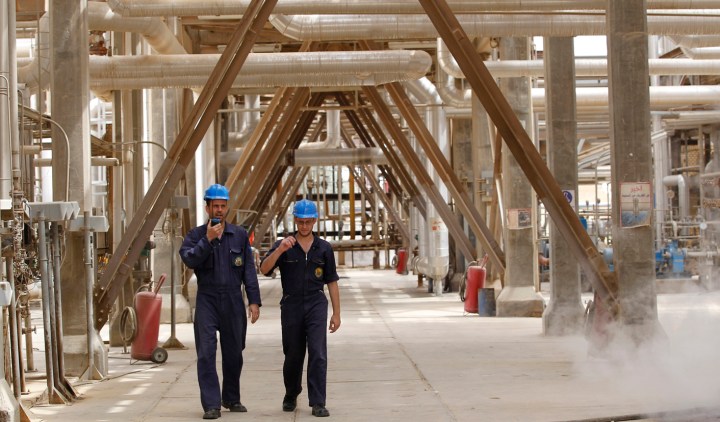Newsdeck
Head in the sand, OPEC sees no oil shale threat

OPEC oil producers are not worried about the shale revolution. They might need to re-run their numbers. By Andrew Callus.
The United States imported 4.5 million barrels a day of OPEC crude last year, 20 percent of the cartel’s exports and about half the country’s import needs.
But thanks to new technologies like hydraulic fracturing now sucking away on North American soil, the continent is already self sufficient in natural gas, and is eyeing an even bigger landmark — OPEC-free oil supplies.
The U.S. was the fastest-growing non-OPEC oil producer in 2011 for the third year in succession, the annual BP statistical review released on Wednesday said. U.S. oil production is up 1 million bpd since 2006 to 7.84 million bpd, consumption is down 1.85 million to 18.84 million.
“In 1990, North American reserves and production were falling but thanks to unconventionals, proved reserves have risen 68 percent since then,” ConocoPhillips CEO Ryan Lance told an audience of OPEC ministers on Wednesday.
“North America could become self sufficient in oil as well (as gas) by 2025,” he said at a conference before OPEC’s policy-setting meeting in Vienna.
State oil company Saudi Aramco, the world number-one oil producer, has acknowledged the North American boom in shale, tar sands and other so-called unconventional production, but its prediction in November was far less explosive, at 6.6 million barrels a day – still well short of U.S. needs, and not until 2035.
And OPEC ministers gathering to decide output policy caps took a very relaxed view of the threat that shale oil might pose.
“Oil from the Middle East will always find a home,” said Kuwaiti Oil Minister Hani Hussein. “And we have to wait to see more research to get a better idea about the impact of shale oil development.”
“No, I’m not worried at all, they are only projections,” agreed Rafael Ramirez, his Venezuelan counterpart. He scoffed at the idea that “shale oil will come to the rescue of consumers, allowing them to shake off the yoke of OPEC.”
But the U.S. government’s Energy Information Administration has repeatedly torn up its forecasts as shale and oil sands change the game at pace.
So should OPEC fret a little more?
“In some ways they should. Not because North America may become self sufficient, but for the reasons why,” said Paul Stevens, a senior research fellow at the Chatham House Royal Institute of International Affairs in London.
“Given the changes in technology involved, if that is applied elsewhere then the assumption that all future increase in global demand will be filled by OPEC is called into question.”
Stevens makes an important point. Unconventional oil reserves are spread in a different pattern from traditional ones. Even resource starved world number-one oil importer China has some, and non-OPEC Russia appears to have the biggest of them all.
“If I was an OPEC minister I would be concerned,” he said. “This could be significant.”
PRICE STUTTER
The recent sharp drop in U.S. oil prices from above $100 a barrel in March to near $80 today could yet slow the march of the unconventional producers and – ironically as OPEC hawks call for production cuts to send it back up – buy members some time.
Top exporter Saudi Arabia might even be tempted at some point, as it has done in the past, to use its production muscle to force down prices to retain market share by making higher cost production uneconomic.
Operating costs of Canadian tar sands – the most marginal of current unconventional production – is about $60 a barrel. Mosat analysts agree that a fall to that level would start to impact production there and push new projects into the future.
The state of the art U.S. Port Arthur refinery extension, run jointly by Saudi Aramco and Shell, is designed to use for Saudi crude is also “a foot in the door for Saudi into the U.S. market for the long run” according to a Middle East-based executive of a major international oil company. He said OPEC, and Middle East producers in particular, will increasingly have to look east for their markets in future.
At its 161st meeting, the 52-year old Organization of Petroleum Exporting Countries that has survived the offshore drilling boom and any number of price slumps maintains its confidence.
“That’s good,” said Secretary-General Abdullah al-Badri of the prospect for U.S. oil self-sufficiency. “We want everybody to be self sufficient. But there will be a place for OPEC oil whatever happens.” DM
Photo: Iraqi workers walk through the al-Doura refinery in Baghdad April 9, 2012. REUTERS/Mohammed Ameen



















